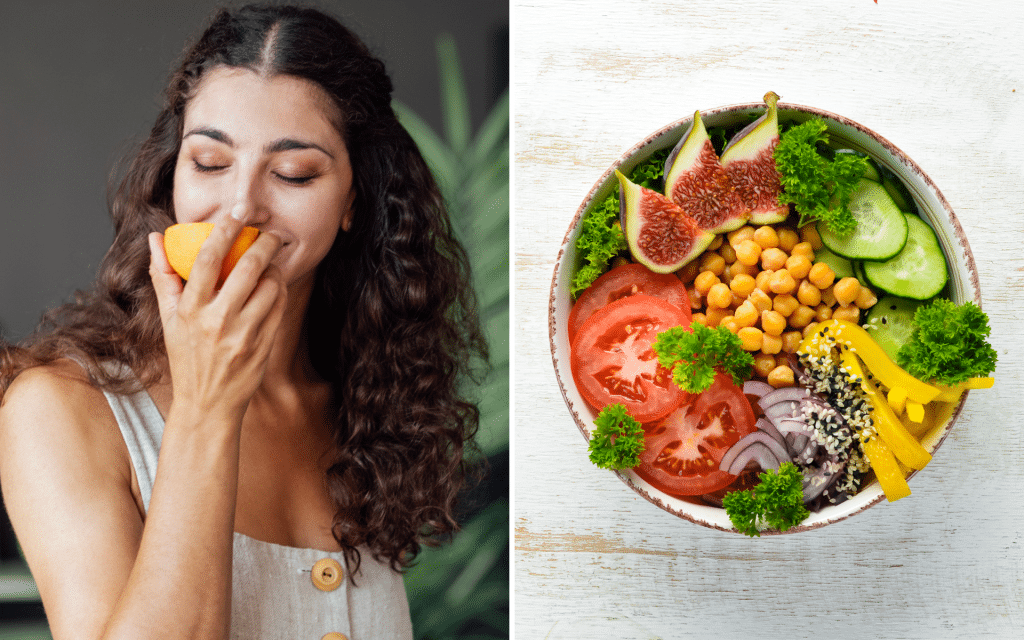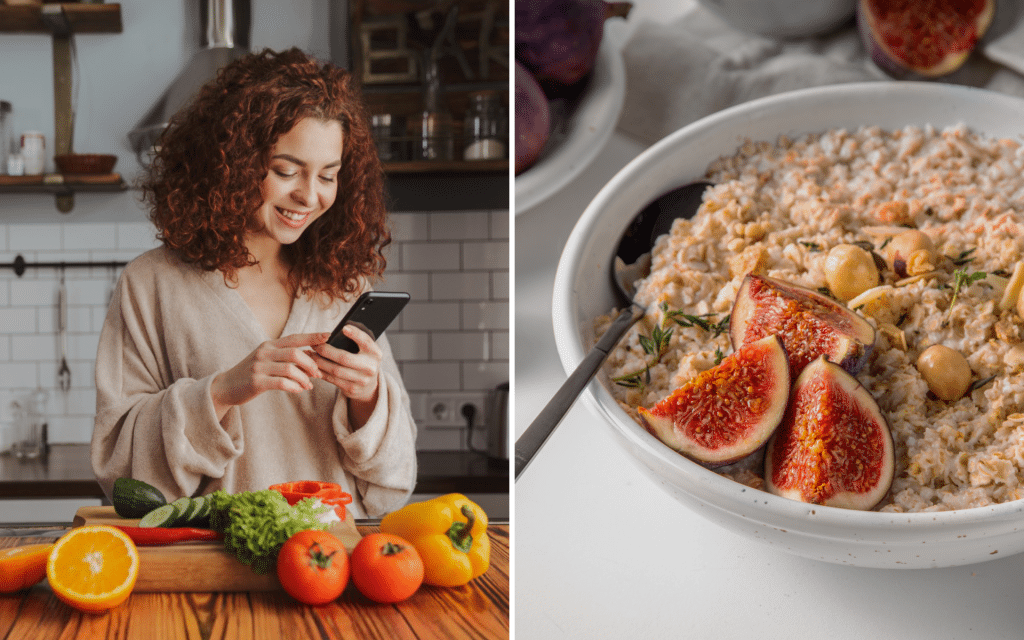Veganism and intermittent fasting are in the top 10 of today’s most popular healthy eating and weight loss plans. However, it’s not very common to combine the two.
So, can a vegan practice intermittent fasting?
What would such a schedule and meal plan look like?
Here is all you need to know about the intermittent fasting vegan meal plan.
What Is An Intermittent Fasting Vegan Meal Plan?
An intermittent fasting vegan plan is a dietary program that follows the principles of both the vegan diet and intermittent fasting.
A vegan diet is a branch of vegetarianism that prohibits the consumption of all animal products like meats, poultry, seafood, eggs, honey, and more.
Most consider veganism the strictest of all vegetarian diets because it excludes the intake of all animal products. The diet also encourages vegans to extend this rule to their lifestyle and not use any products made from the exploitation of or cruelty to animals (1, 2).
Intermittent fasting (IF), on the other hand, is less of a diet and more of an eating pattern that cycles between periods of voluntary abstinence from food and drink (known as the fasting window) and hours of eating (aka the feeding window (3, 4).
There are many ways to do intermittent fasting. However, the two most common types are:
-
Time-Restricted Eating
The type of daily intermittent fasting where you restrict your eating windows to a set number of hours each day. The most common variations are the 16:8, 14:10, and 12:12 – where the feeding windows can be 8, 10, and 12 hours.
-
The 5:2 Diet
Unlike time-restricted eating, where you fast daily, the 5:2 diet only requires you to fast twice a week – but with a caveat. This IF plan does not stipulate what you choose to eat on 5 days of the week, however, on the 2 fasting days, followers restrict their daily caloric intake to about 500-600 daily calories. For safety purposes, while following this diet, experts recommend refraining from fasting two days in a row.
You should skip a day or two between these fasting days.
A person following the intermittent fasting vegan diet will choose one of the above-mentioned IF plans and follow that while on a solely plant-based diet.
Is Intermittent Fasting Good For Vegans?
It can be safe and potentially beneficial for otherwise healthy adults, but it requires some care and planning to ensure you meet all your nutritional needs.
The possible benefits of combining IF with a vegan diet:
Weight Loss
If you’ve been hoping to shed those extra stubborn pounds but nothing is working for you then this diet plan could be what you are missing.
According to research, intermittent fasting seems to have beneficial effects that are equivalent to caloric restriction in terms of body weight control (5).
Maintaining a calorie deficit is one of the main pillars of weight loss.
Consuming fewer calories than your body burns in a day will eventually lead to fat and weight loss.
While you may not necessarily need to count calories while doing intermittent fasting, restricting your food intake to just a few hours a day can inadvertently lead to calorie restriction.
Some consider plant-based diets to be effective for treating and preventing both becoming overweight and obesity (6). Plant-based foods tend to be lower in calories than animal-based foods. These eating plans are also naturally high in fiber (7), which helps to boost satiety thus helping with calorie restriction.
How Much Weight Can You Lose On An Intermittent Fasting Vegan Meal Plan?
Intermittent fasting vegan weight loss results will differ from person to person. No results are identical because weight loss depends on multiple factors, such as:
- Age
- Sleep
- Genetics
- Starting weight
- Workout intensity
- Not just diet and calorie intake alone (8).
According to the CDC, a healthy and sustainable rate of weight loss is approximately 1-2 pounds per week (9).
Therefore, if you stick to a healthy calorie deficit plan, exercise, and sleep 7-9 hours a night, you may experience intermittent fasting vegan results of 4-8 pounds lost in a month.
Reasons why BetterMe is a safe bet: a wide range of calorie-blasting workouts, finger-licking recipes, 24/7 support, challenges that’ll keep you on your best game, and that just scratches the surface! Start using our app and watch the magic happen.
Improved Gut Health
While we still need more research on the matter, studies on both plant-based diets and intermittent fasting had two factors that positively affect gut microbiota (10, 11).
Plant-based diets tend to be high in fiber, which is beneficial for gut health, and intermittent fasting may affect the microbiome.
Studies and experts suggest that improved gut health supports immune function and can help reduce the risks of:
Improved Blood Sugar Control
Research on the vegan diet and intermittent fasting has shown that both options can help improve insulin sensitivity and reduce insulin resistance.
In both cases, these effects can relate to weight loss. The insulin improvements could benefit overweight/obese individuals since they are at higher risk for type 2 diabetes, but also those who are prediabetic or already suffering from type 2 diabetes (14, 15).
- If you are pre-diabetic or suffering from type 2 diabetes, be sure to first consult your doctor before switching your meal plan to an intermittent fasting vegan diet.
Read more: Intermittent Fasting Food List: What You Should Eat And What You Should Avoid
What Should A Vegan Eat On Intermittent Fasting?
While on an intermittent fasting plan, vegans should try to keep their diet as nutrient-dense as possible, meaning:
- Eating primarily whole and minimally processed foods (about 80%).
- Avoiding or minimizing overly processed foods (about 20%).
Examples of what a vegan should eat while intermittent fasting, include:
- Plant-based proteins: They help with satiety and increased metabolism, as well as maintaining muscle mass.
Accessible examples include: Beans, tofu, tempeh, lentils, and chickpeas.
- Whole grains: Such as quinoa, brown rice, and whole-wheat bread help boost satiety as they are high in fiber.
- Nuts and seeds: Almonds, chia seeds, and flaxseeds provide healthy fats and omega-3s.
- Starchy and non-starchy vegetables: Rich in antioxidants and fiber.
- Fruits: Also antioxidant-rich, great for your immunity and fiber.
Berries, apples, bananas, watermelons, peaches, citrus fruits, etc. are all fantastic examples.
- Plant-based milk alternatives: Dairy is an animal product, so vegans cannot consume it. Instead, they can opt for other options such as almond, coconut, oat, and soy milk, which can be fortified with calcium and vitamins.
- Healthy fats: Avocado and olive oil and other plant-based oils offer essential fatty acids.
- Water, unsweetened tea, and coffee: They do not have any calories in them and are the only things you can consume during the fasting window.
Not only do they keep you hydrated, but they can also help mitigate hunger till the feeding window opens.
What Is A Balanced Intermittent Fasting Vegan Meal Plan Like?
A generally balanced diet involves consuming the following (16):
- At least 5 portions of a variety of fruits and vegetables every day
- High-fiber starchy foods like potatoes, bread, rice, or pasta – preferably from whole grains and starchy vegetables
- Dairy or dairy alternatives
- Protein from animal or plant-based sources
- Unsaturated oils and spreads eaten in small amounts.
- At least 6-8 glasses of water a day
As a vegan practicing intermittent fasting and aiming to maintain a balanced diet, you must follow the above rules.
However, you should also:
- Stick to dairy alternatives, as dairy is not allowed, and look for dairy-free options fortified with calcium, vitamin D, and vitamin B12
- Choose oils and spreads that are not made from or mixed with animal-based products
- Only consume plant-based proteins
When it comes to weight loss, progress is made by inches, not miles, so it’s much harder to track and a lot easier to give up. The BetterMe: Health Coaching app is your personal trainer, nutritionist, and support system all in one. Start using our app to stay on track and hold yourself accountable!
What Are The Foods To Avoid On Intermittent Fasting As A Vegan?
The main food groups to avoid while on such a diet are:
- All animal products: Meat, poultry, fish, dairy products (milk, cheese, yogurt), eggs, and honey.
These foods go against the rules of veganism, so avoid them as a vegan whether intermittent fasting or not.
- Overly processed foods: This includes many popular vegan foods and refined carbohydrates. They are often high in added sugars or sodium and very high in calories, which can contribute to weight gain if they make up a large portion of your diet.
- High-sugar drinks: This includes sodas, energy or sports drinks, pre-packaged fruit juices, etc.
- Alcohol
Do Vegans Go Into Ketosis?
Yes, vegans can go into ketosis if they follow a vegan keto diet. Because the vegan diet is generally high in carbs, they need to closely monitor their carb intake by limiting their intake of high-carb foods and increasing their intake of healthy plant-based fats.
Read more: Fasting 20 Hours Benefits: Impact on Health and Well-Being
What Is The Hardest Intermittent Fasting?
Hard is subjective; thus, the answer may change depending on the person asked.
However, many have rated the following fasting patterns as the most extreme and hardest intermittent fasting variations:
- Alternate day fasting – Only consuming 500 calories every other day
- The warrior diet – Aka the 20:4 intermittent fasting
- OMAD – Aka ‘one meal a day’ where you fast 23 hours a day and only have one hour to consume all your calories
The dirty vegan diet relies on highly processed foods rather than healthy whole foods. Common foods found in a dirty vegan diet include deep-fried ‘cauliflower chicken,’ vegan ice creams, processed vegan burgers, etc. It is hard to eliminate carbohydrates as a vegan fully. However, you can reduce your intake by relying more on high-protein, low-carb foods like nuts and seeds, soy products like soybeans, tofu, soy milk, tempeh, seitan, and plant-based protein powders. Some of the most low-carb fruits include watermelon, berries, cantaloupe, avocados, peaches and pineapples. These are great options if you intend to follow a low-carb vegan diet plan.Frequently Asked Questions
What is a dirty vegan diet?
How do vegans get protein without carbs?
What is the lowest carb fruit?
The Bottom Line
An intermittent fasting vegan plan can be an excellent idea for someone who is health-focused or wishes to lose weight on a plant-based diet.
As mentioned above, studies show that veganism and IF may have multiple health and weight loss benefits that can improve your general well-being.
If you choose to try such an eating plan, please speak to your doctor, especially if you have an underlying health condition, such as, diabetes. Also, try your best not to follow a dirty keto plan and keep the meal plan as nutritious as possible for the best results.
DISCLAIMER:
This article is intended for general informational purposes only and does not serve to address individual circumstances. It is not a substitute for professional advice or help and should not be relied on for making any kind of decision-making. Any action taken as a direct or indirect result of the information in this article is entirely at your own risk and is your sole responsibility.
BetterMe, its content staff, and its medical advisors accept no responsibility for inaccuracies, errors, misstatements, inconsistencies, or omissions and specifically disclaim any liability, loss or risk, personal, professional or otherwise, which may be incurred as a consequence, directly or indirectly, of the use and/or application of any content.
You should always seek the advice of your physician or other qualified health provider with any questions you may have regarding a medical condition or your specific situation. Never disregard professional medical advice or delay seeking it because of BetterMe content. If you suspect or think you may have a medical emergency, call your doctor.
SOURCES:
- Vegan Diet (n.d., sciencedirect.com)
- Vegan diet: nutritional components, implementation, and effects on adults’ health (2023, pmc.ncbi.nlm.nih.gov)
- INTERMITTENT FASTING AND HUMAN METABOLIC HEALTH (2016, pmc.ncbi.nlm.nih.gov)
- Intermittent Fasting: Exploring Approaches, Benefits, and Implications for Health and Weight Management (2024, npjournal.org)
- Beneficial effects of intermittent fasting: a narrative review (2022, pmc.ncbi.nlm.nih.gov)
- A plant-based diet for overweight and obesity prevention and treatment (2017, pmc.ncbi.nlm.nih.gov)
- A Look at Plant-Based Diets (2021, pmc.ncbi.nlm.nih.gov)
- Factors That Influence Body Weight (n.d., ncbi.nlm.nih.gov)
- Steps for Losing Weight (2025, cdc.gov)
- Effect of Plant-Based Diets on Gut Microbiota: A Systematic Review of Interventional Studies (2023, pmc.ncbi.nlm.nih.gov)
- A Scoping Review of the Relationship between Intermittent Fasting and the Human Gut Microbiota: Current Knowledge and Future Directions (2023, pmc.ncbi.nlm.nih.gov)
- Improving your gut health improves all aspects of your health, including your mood (2024, uchealth.org)
- Elucidating the role of diet in maintaining gut health to reduce the risk of obesity, cardiovascular and other age-related inflammatory diseases: recent challenges and future recommendations (2024, pmc.ncbi.nlm.nih.gov)
- Effect of a Low-Fat Vegan Diet on Body Weight, Insulin Sensitivity, Postprandial Metabolism, and Intramyocellular and Hepatocellular Lipid Levels in Overweight Adults (2020, jamanetwork.com)
- Early Time-Restricted Feeding Improves Insulin Sensitivity, Blood Pressure, and Oxidative Stress Even Without Weight Loss in Men with Prediabetes (2019, pmc.ncbi.nlm.nih.gov)
- Eating a balanced diet (2025, nhs.uk)










